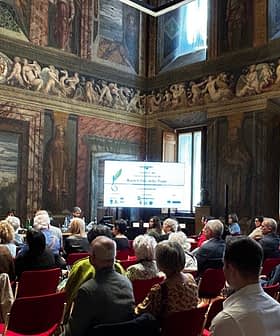Peru Rediscovers Its Own Olive Oils
Peru has a centenary tradition of olive cultivation which started in the colonial period but was soon interrupted. In the last decades, the spotlight on gastronomy and Peruvian cuisine has created a renewed interest in domestic olive oil production.
 Chef Virgilio Martínez
Chef Virgilio MartínezThe transformation of olive oil production in Perú and the interest generated by Peruvian cuisine in the last two decades have helped drive more attention towards a domestic olive oil industry.
Cooks, mixologists, sommeliers, and servers must be trained to promote our domestic olive oils as a culinary expression of Perú’s biodiversity.
Perú has a centenary tradition of olive cultivation which started when olive trees were brought from Spain in 1560 and planted to obtain oil for religious rituals and the lamps illuminating the churches. The trees adapted quickly to the country’s climate and topographic conditions, especially those of the Southern coastal valleys, from Ica to Tacna.
The religious dimension predominated in the centuries that followed when olive oil production for human consumption was limited and artisanal, and oliviculture basically restricted to missionaries and the country’s upper classes.
The importance of Perú’s Viceroyalty as the axis of Spain’s colonial power in South America was instrumental in olive cultivation. Oils attained such a good quality that in the 17th century the Spanish Crown determined to eradicate olive groves and oil production in Perú because of the competition it represented to olive oils imported from Spain.
Peruvian olive oil production decreased thereafter. Olives from the trees which remained were not processed for oil but rather consumed as table olives. Initially a culinary delicacy, table olives later became a key component of Peruvian gastronomy as silviculture progressed.
In the 20th century olive oil production was actively resumed. In the 21st, the interest in Peruvian cuisine has exploded contributing to a reevaluation of local culture and the improvement of the quality of domestic olive oils.
Chef Gastón Acurio served as driving force of a movement that heightened Peruvian flavors and recovered ingredients as pillars of this new culinary boom with tremendous media exposure. Projects such as Mistura, a multitudinous gastronomic event, were born, becoming important forums for the promotion of local foods including olive oil.
Specialized production, the professionalization of workers, and large investments to improve agrarian and industrial facilities contributed to the improvement of Peruvian olive oil quality, as well as to larger yields. Perú now is one the largest olive oil producers and exporters in South America.
“Olive oil quality has definitely improved, but there is room for further improvement,” affirmed Gianfranco Vargas Flores, a Peruvian researcher, olive expert and oil producer.
Toward this end and to preserve identity, in 2016 Perú started a multidisciplinary research project that pursues the identification of the country’s olive heritage through an inventory of the country’s oldest living olive trees.
Most of Perú’s olive orchards were planted in the second half of the 20th century. Criolla or Peruvian Sevilla — a mutation of the first olive varieties imported to the country — is the most important local olive cultivar, occupying 85 percent of the country’s olive plantations, most of which are concentrated in Tacna.
Olive oil consumption in Perú increases on a yearly basis but can grow more. Vargas noted that most new sales are made at drugstores and natural product stores, suggesting health is an important consideration for Peruvian consumers.
Table olives remain important in regional cuisines, both traditional and contemporary, and domestic olive oils are gaining attention from awards received in international oil competitions and also because of their use by renowned chefs.
“At Señorío de Sulco, Chef Flavio Solórzano uses oils from centenary trees, whose Criolla variety was picked at different stages of ripeness, producing diverse oils,” indicated Vargas. A fan of olive oil and a promoter of local products, Chef Virgilio Martínez, from the top restaurant Central, switched his Spanish for Peruvian EVOO once the quality of the latter improved.
According to Vargas, over 60 olive oil brands are registered in Perú, although just ten are well known.
“Cooks, mixologists, sommeliers, and servers must be trained to promote our domestic olive oils as a culinary expression of Perú’s biodiversity,” indicated Vargas, who has been conducting tastings and training among sommeliers and culinary arts schools to make them familiar with the organoleptic characteristics of local olive oils.








